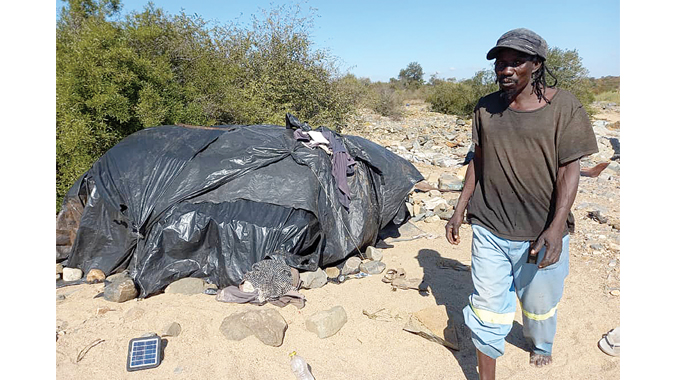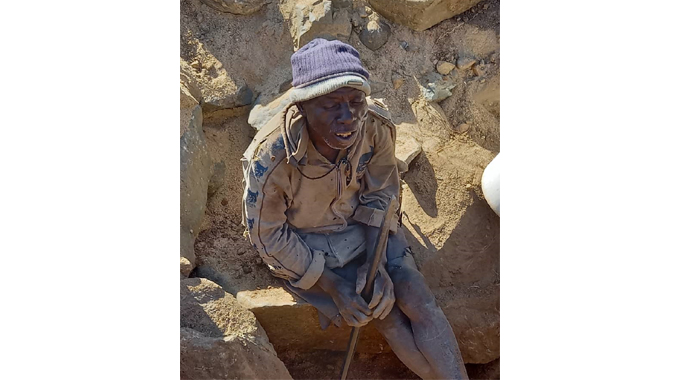Married to the river

Patrick Chitumba, Midlands Bureau Chief
HE identifies himself as KB Nebiri (45) and for the last three months he has not been at his home in Gokwe as he is focused on panning for gold along Mtsingwe River in Mberengwa District.
Before that, he was panning for gold along Gorokodayi River but high-water levels repelled him as he does not have pumping equipment.
Along Mtsingwe River, KB is part of scores of artisanal gold miners that have made the river their home in search of the yellow mineral.
Gold panning is the cheapest and oldest method of mining gold from placer deposits, which occur along the river/stream beds.
An artisanal miner or small-scale miner (ASM) is a subsistence miner who is not officially employed by a mining company, but works independently, mining minerals using their own resources, usually by hand.

KB Nebiri in the middle of Mtsingwe River in Mberengwa
For KB Nebiri, his life is now tied to panning and views himself as someone who is married to the river because of the closeness and the time he spends there panning, preparing food or sleeping.
He has a makeshift tent made of black plastic, which is mounted right in the middle of Mtsingwe River.
Inside the tent are three or four cheap quality blankets and some decent clothes, which he wears when going to Zvishavane Town or when going back home in Gokwe to meet family.
With his foodstuff stashed in one of the corners, small solar charging system and other necessities, KB Nebiri says he is not even worried or afraid of crocodiles, snakes or drowning in case there is flooding upstream.
All he cares about is his immediate need to pan so that he makes money.
“I’m KB Nebiri originally from Kariba. I have a family in Gokwe, I have 12 children whom I am looking after from panning proceeds,” he says.
“The river is my life, the river is the source of my livelihood. I am basically married to the river. I work on the river, sleep on the river and only get out in case we have visitors like you or I need to send money to Gokwe to my wife and children.”
The man says he wakes up early in the morning and gets busy until it gets dark and has no weekends or off days.
“This is my life and I follow the money in rivers. Instead of sitting at home waiting for a miracle, I had to migrate you know and this is me.
“I am in constant communication with my wife and children because I have the solar charger to charge my cellphone and torch,” he said.

Masimba
KB Nebiri’s toolkit includes a wide pan made of wood, spade, shovel, iron wedge and a crowbar.
“Gold panning is actually a very simple method. Gravel from a placer deposit is scooped up and placed in the pan. Water is added and the pan is shaken to distribute the gold to the bottom while the lighter materials such as gravel and mud are discharged. I then look for a gold buyer, in fact they visit time and again and we sell to them,” he said.
This news crew observed that around the river bed there are a lot of trenches that have been dug by different gold panners. KB Nebiri claims that they dig in such a way that when it rains, the sand and the soil they remove from the trenches is swept back by the floods.
In one of the trenches is Masimba (64) who had no time for talking saying he was busy scooping sand from between rocks and filling a 20-litter bucket before taking it to a heap of sand he has created on the river bed.

Masimba
Just like KB Nebiri, Masimba and scores of gold panners risk it all for the gold.
“As you can see, I am working my way round boulders, rocks on the river bed. It needs a bit of skill so that I don’t disturb these rocks or else they will fall on me. Now I am busy, my friend,” he said as he continued with his work.
Panning for gold along the riverbanks is illegal.
The police conduct routine raids, but it is a cat-and-mouse game as they always maintain their presence in the river.
“This is where we get our money for food and the only thing that will stop us from working is when it is raining and the river is full of water,” said KB Nebiri.
ASM relies on a mostly unskilled workforce using rudimentary tools and techniques. Often environmental, health and safety practices tend to be very poor with the panners exposed to dust and fine particles resulting from blasting and drilling, which cause respiratory illnesses.
It also degrades crops and farmlands, resulting in lost food production.
Streams and rivers often become polluted near ASM sites, which makes water unsafe for drinking and can also affect fish stocks previously relied upon for food.

Environmental Management Agency
Environmental Management Agency (EMA) Midlands provincial manager Mr Benson Bhasera said illegal gold panners were destroying the environment and causing land degradation through their illegal mining activities.
“Illegal gold panners are a menace to the environment. Raids are conducted and they always come back,” he said.
Artisanal and small-scale mining is also the source of the largest releases of mercury, estimated at 1,400 tons per year in 2011, according to the Minamata Convention.
Exposure to mercury can have serious health impacts, including irreversible brain damage.
Mercury is also difficult to contain and can be toxic at even very small doses. It can be transported long distances by air or water, poisoning the soil and waterways, and eventually making its way into the food chain.











Comments